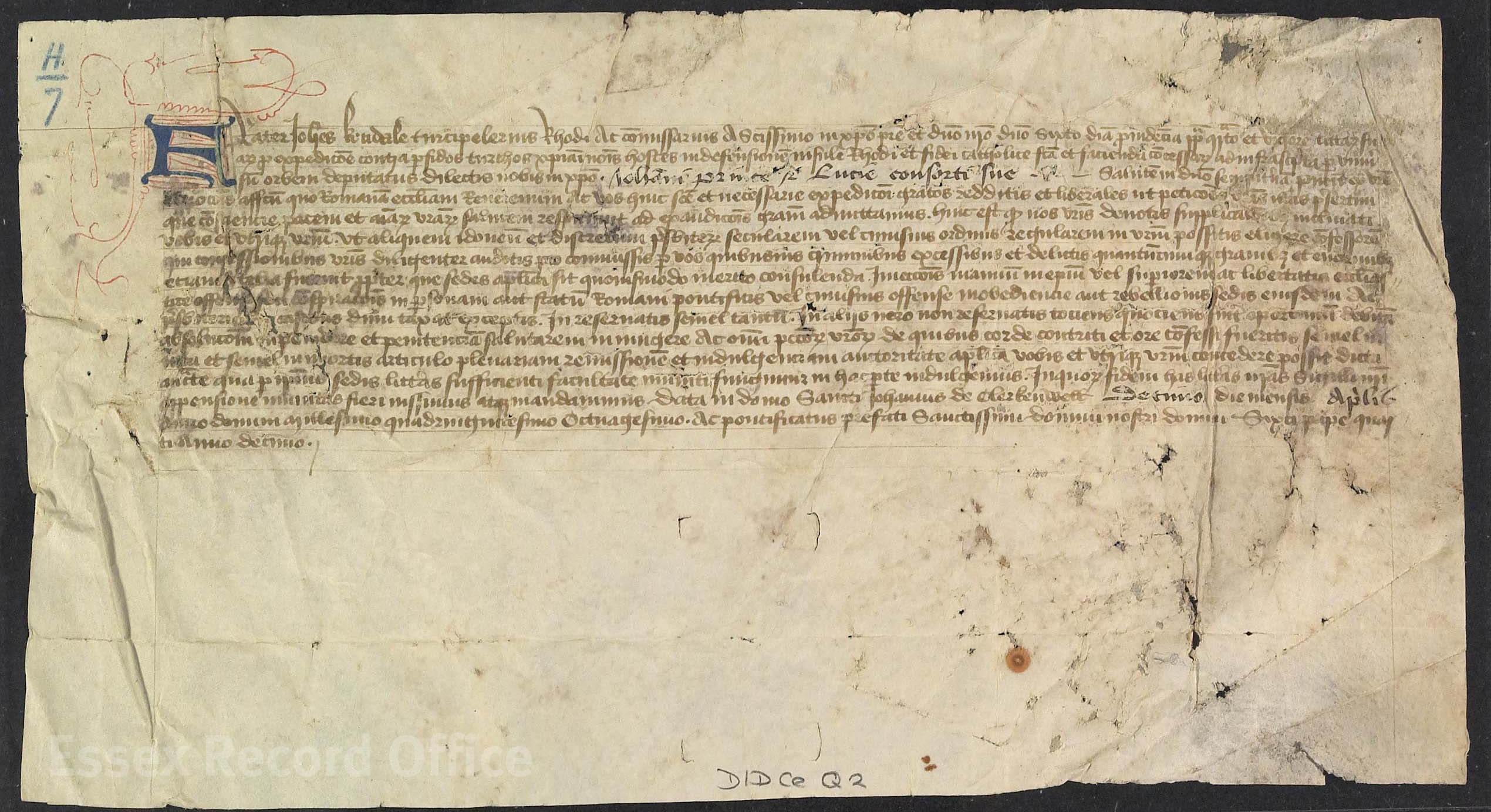Indulgence granted to John and Lucy Prince of Theydon Garnon by John Kendale, turcipelerius of Rhodes and Commissary of Pope Sixtus IV, 10 April 1480 (D/DCe Q2)
Our Document of the Month for August 2017 is a medieval indulgence – a certificate granted by the Catholic Church to absolve the bearer of sin, and reduce any punishment they would receive either in this life or in purgatory.
The document dates from 1480, but we have chosen to highlight it in 2017 because this year marks 500 years since Martin Luther’s publication of his Ninety-Five Theses, an event which is generally seen as the beginning of the Protestant Reformation in Europe. The Ninety-Five Theses is also known as the Disputation on the Power of Indulgences, and criticised the way the Catholic Church was granting these documents.
Indulgences had originally been intended to be a reward for piety and good deeds, but the system had become increasingly commercialised, with indulgences being sold. In 1517 Pope Leo X offered indulgences to those who contributed alms towards the rebuilding of St. Peter’s Basilica in Rome. In Germany a Dominican friar, Johann Tetzel, was prominent in selling indulgences and the saying ‘As soon as a coin in the coffer rings, a soul from purgatory springs’ is attributed to him.
Luther attacked the sale of indulgences not only for their commercialisation, but also because he contended that the Pope had no right to grant indulgences on God’s behalf. He also argued that the selling of indulgences discouraged people from truly repenting of their sins or performing acts of mercy.
This particular indulgence was granted to John and Lucy Prince, ‘in consideration of [their] devotion to the Roman Church and willingness to aid the sacred and necessary expedition against the perfidious Turk and for the defence of the Isle of Rhodes and the Catholic Faith’ [Suarum pro expeditione contra perfidos turchos christinai nominis hostes in defensionem insule Rhodi et fidei catholice facta].
The indulgence was granted by the Knights Hospitallers of St John of Jerusalem, at their English headquarters of St John’s Priory in Clerkenwell. The Knights Hospitallers were a religious and military order charged with defending the Holy Land. Having been based originally in Jerusalem, by this time they had bases across Europe and operated their military activity from the island of Rhodes.
In 1480, the year this indulgence was granted, the Ottomans under Sultan Mehmet II laid siege to Rhodes; granting indulgences was one of the ways the Knights Hospitallers raised money for its defence. Mehmet II had been waging a largely successful campaign against Christian forces since 1453 when he captured Constantinople (Istanbul). Rhodes did not fall until 1522 when it was captured by Suleiman the Magnificent, Mehmet’s great-grandson.
The indulgence gave the Princes the right to choose their own confessor with the power to absolve all sins, other than murder of a priest, violence against a bishop or disobedience towards the Pope. It also granted the right for a full remission and indulgence of sins once during their lifetime and once at the point of death.
The Protestant Reformation centred round the principle that salvation could be achieved by faith alone, not by faith and good works, as emphasised by the Catholic Church. In this Luther built on the works of humanists such as Erasmus. The subsequent emphasis on translating the Bible from Latin into the vernacular (i.e. English) was intended to make it more accessible to everybody.
These principles resonated across Europe in the 16th century, and we can find evidence of them in the ERO collections. In 1588, for example, John Brockise of Havering Green, Hornchurch, a painter, left a will (D/AEW 9/10) in which he bequeathed his most precious possessions. After bequests of furniture to his children, he left to Samuel Brockis the Paraphrase of Erasmus on the Four Gospels and the Acts of the Apostles ‘in consideration that he shalbe good to my wife and to the reste of his bretherne and sister after my desese’ or his wife had the power to withhold the bequest. He left to his son Robert ‘one bybell’ translated by Miles Coverdale on the same basis. Miles Coverdale first translated the Bible into English in 1535.
So this one little document which is today looked after as part of the collections at ERO is a small part of a big story about a transforming world. We will not ever know what sin John and Lucy Prince felt they needed an indulgence for, but in the world of medieval Catholic belief it was better to be safe than sorry.
The indulgence will be on display in the ERO Searchroom throughout August 2017.


Many thanks for showing the image of this fascinating document – I will try to come in to the search room to see it.
Best wishes
Sue Howlett
Thanks Sue, hope you can make it in this month!